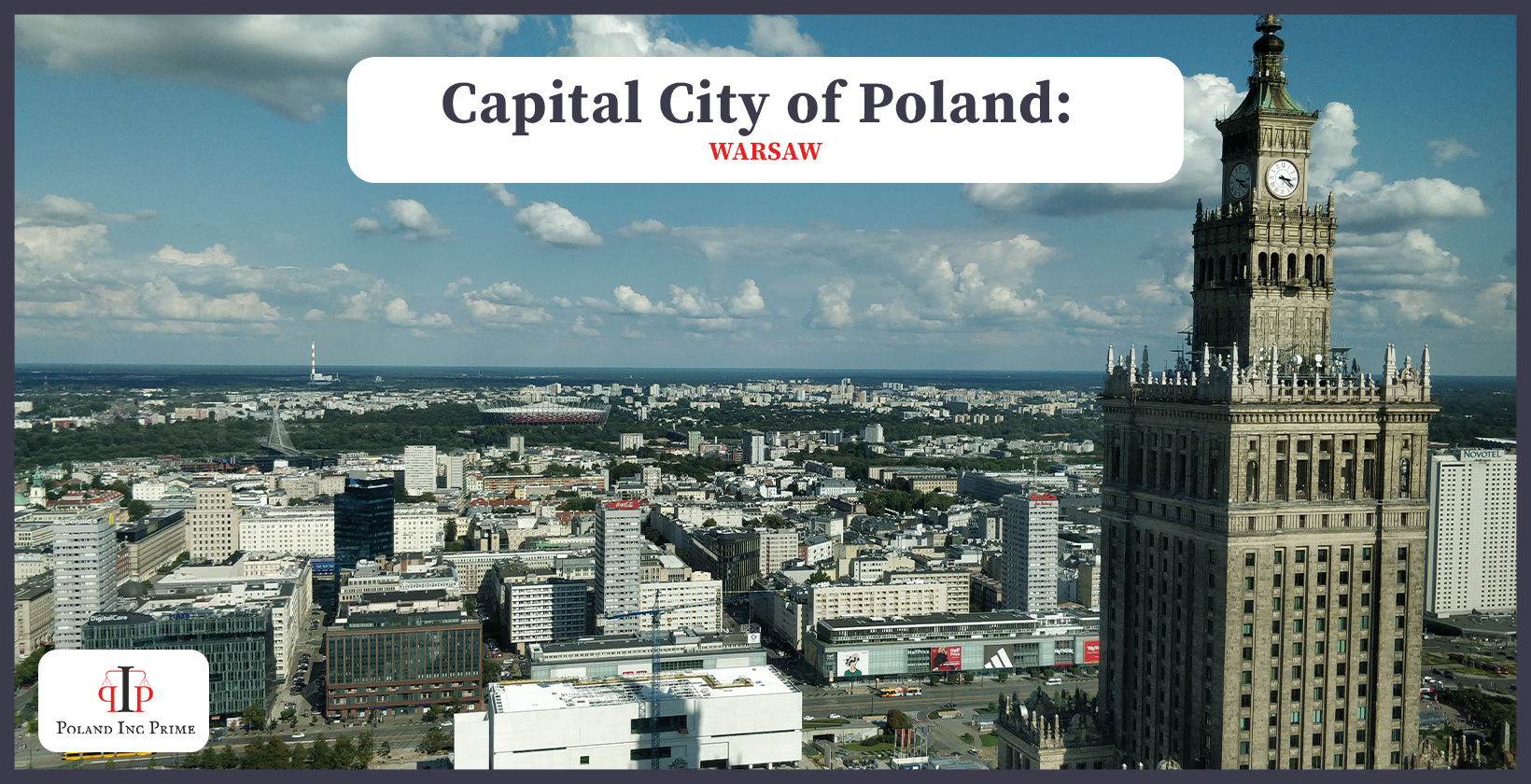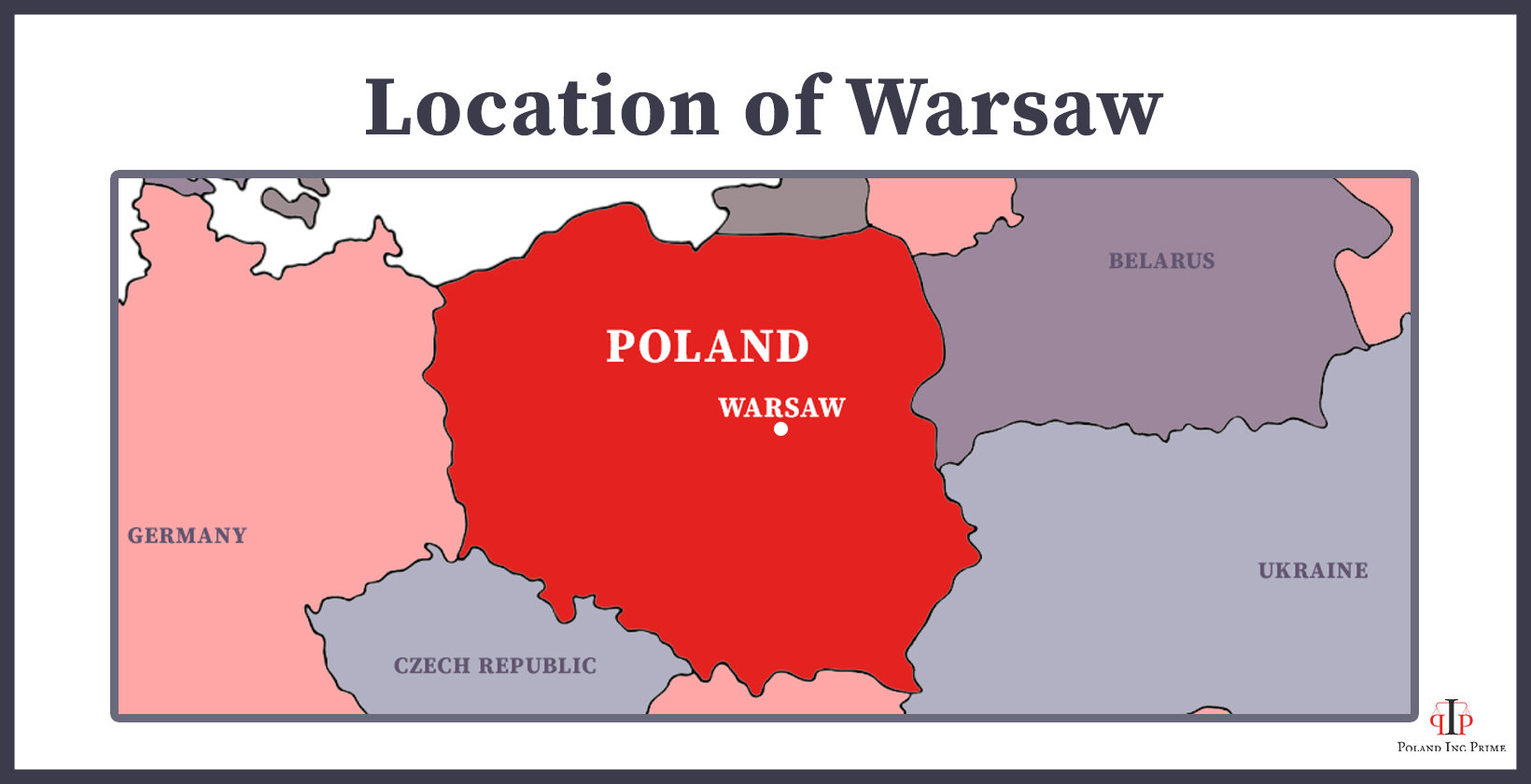
Capital City of Poland: Warsaw
Warsaw is the capital and largest city of Poland, located along the Vistula River. Warsaw is situated in east-central Poland, making it a strategic hub for both domestic and international trade and commerce. The city is served by Warsaw Chopin Airport (WAW), which is the largest and busiest airport in Poland. It operates as a major transportation hub, connecting Warsaw to various destinations around the world. Warsaw has a population of approximately 1.7 million people.
Warsaw has a thriving and dynamic environment for businesses. It serves as the economic and financial center of Poland, with a strong presence of both domestic and international companies. The city has seen significant economic growth in recent years, attracting investments in various sectors, including finance, technology, manufacturing, and services. Warsaw hosts a diverse range of businesses including financial services, IT, automotive, retail, and tourism.
Table of Contents
Where is Warsaw located?
Warsaw is located in east-central Poland, positioned at approximately 52.2297° N latitude and 21.0122° E longitude. It is situated about 300 kilometers (186 miles) west of the Polish-Ukrainian border and approximately 300 kilometers (186 miles) east of the German-Polish border. This central location within Poland places Warsaw as the nation’s capital in a strategic position, serving as a vital economic and cultural hub.

Warsaw is nestled within the Mazovia Voivodeship (province), the largest and most populous in Poland. Its geographic location makes it a gateway not only to Poland but also to neighboring countries in Central Europe. To the west, it shares borders with Germany, and to the east, it is sharing borders with Ukraine. In terms of Europe as a whole, Warsaw is located in the eastern part of the continent, closer to its eastern border. This favorable position has historically contributed to Warsaw’s significance as a center of commerce and cultural exchange in the region, especially that it is positioned within the Central European Time (CET) time zone.
What is the time zone in Warsaw?
The time zone in Warsaw is Central European Time (CET), which is UTC+1. During daylight saving time, it transitions to Central European Summer Time (CEST), UTC+2.
Does Warsaw have an airport?
Yes, Warsaw has an airport. It is known as “Warsaw Chopin Airport” and has the IATA code “WAW.” This international airport serves as a major transportation hub for the city and the country, connecting Warsaw to various domestic and international destinations. Warsaw Chopin Airport is one of the busiest airports in Poland, catering to the needs of Warsaw’s population of approximately 1.7 million people.
What is the Population in Warsaw?
The population of Warsaw is approximately 1.7 million people. It’s worth noting that Warsaw has a dynamic and growing entrepreneurial community, with many startups and small businesses contributing to the city’s economic vibrancy.
How much of Warsaw’s population is entrepreneurial?
According to findings from the Global Entrepreneurship Monitor, approximately 5% of Poland’s adult population is actively engaged in the establishment or operation of new businesses, a metric referred to as Total Early Entrepreneurial Activity (TEA). Over the past decade, there has been a noticeable shift in entrepreneurial activity within Poland. The proportion of individuals involved in nascent business ventures has declined from 9% to 5.4% of the adult population, while those engaged in more established businesses have risen significantly from 5% to 12.8%. Warsaw, as the capital and economic center of Poland, often reflects and influences national entrepreneurial trends. The city hosts a thriving startup ecosystem and a growing number of entrepreneurs contributing to its economic dynamism.
Is the Capital of Poland a good place for business?
Yes, the capital of Poland, Warsaw, is considered a good place for business. Warsaw boasts a diverse and growing economy, making it a favorable location for businesses across various industries. It is the economic and financial heart of the country and offers several advantages for entrepreneurs and corporations. Warsaw’s economy is robust and diversified, with key sectors including finance, technology, manufacturing, and services. It contributes significantly to Poland’s overall economic growth.
The city provides numerous opportunities for businesses to thrive, especially in sectors like IT, finance, and startups. The presence of multinational corporations and a skilled workforce enhances the business environment. Warsaw has well-developed infrastructure, including modern office spaces, transportation networks, and communication facilities, which support business operations. Being centrally located in Europe, Warsaw provides access to a vast European market, making it an attractive base for companies looking to expand their reach.
The Polish government offers various incentives and support programs to encourage entrepreneurship and foreign investment, further enhancing the business climate. However, like any city, Warsaw also presents its own set of challenges and competition. Success in the city’s business environment depends on factors such as market research, business planning, and adaptation to local regulations and culture. Therefore, while Warsaw offers promising business opportunities, it’s essential for entrepreneurs and companies to conduct thorough research and due diligence before establishing their presence in the city.
Are there business opportunities in Warsaw?
Yes, Warsaw offers a diverse array of business opportunities across various industries. Its dynamic economy and strategic location make it an attractive destination for entrepreneurs and corporations alike. Warsaw offers diverse opportunities in technology and startups, including software development, cybersecurity, and innovation. The city hosts multiple tech incubators and accelerators, fostering an entrepreneurial culture.
As Poland’s financial hub, Warsaw has a thriving financial services sector encompassing banking, insurance, investment, and fintech. The well-established industry continuously evolves. Additionally, Warsaw’s robust manufacturing sector, especially in automotive production, welcomes manufacturers and suppliers.
The city’s rich history and growing tourism sector create openings in hospitality, from hotels and restaurants to retail businesses. Real estate and construction sectors are expanding, thanks to ongoing infrastructure projects. Warsaw’s sustainability focus opens doors in renewable energy, waste management, and environmental consulting. The education and training sector offers opportunities for private institutions, training centers, and EdTech ventures, given the city’s role as an education and research hub.
What are the most common businesses in Warsaw?
The most common businesses in Warsaw are financial services, IT, manufacturing, hospitality, retail, and real estate.
The financial sector thrives due to the city’s central location and access to European markets. Warsaw is the financial capital of Poland, hosting numerous banks, insurance companies, and financial institutions.
IT in Warsaw has a burgeoning scene, with a focus on software development, cybersecurity, and innovative startups. This is driven by the availability of skilled tech talent and a supportive ecosystem of incubators and accelerators.
Manufacturing is a well-established sector in the city and its surrounding region, including automotive production and related industries. Proximity to European markets and skilled labor contribute to its success.
Hospitality is thriving on Warsaw’s rich history, cultural attractions, and growing tourism industry. This includes hotels, restaurants, and businesses catering to both tourists and locals.
Retail businesses, including both physical stores and e-commerce ventures, find ample opportunities in Warsaw due to the sizable population and increasing consumer spending.
Ongoing infrastructure projects and urban development create a demand for real estate and construction services. Warsaw’s growth fuels this sector.
In the past 15 years, Warsaw has seen a rise in businesses related to sustainability, including green technology startups and eco-friendly products. Additionally, as the city’s tech ecosystem matures, artificial intelligence (AI) and data analytics companies are gaining prominence. These businesses align with global trends and Warsaw’s commitment to innovation and sustainability.
What are the trending business industries in Warsaw?
The trending business industries in Warsaw include sustainability and green technology, Artificial Intelligence (AI) and Data Analytics, E-commerce, and Online Retail. Warsaw is placing increasing emphasis on sustainability and environmental initiatives, leading to a surge in businesses related to renewable energy, waste management, and eco-friendly products. This trend aligns with global efforts to combat climate change and promote sustainability.
Warsaw’s tech ecosystem is maturing, with a growing number of AI and data analytics companies. These businesses leverage Warsaw’s pool of skilled tech talent to address various industries’ needs, from finance to healthcare. Warsaw’s expanding consumer base and the rise of digital technologies have boosted e-commerce and online retail businesses.
While these industries are trending, it’s important to note that competition is challenging, especially in the tech and sustainability sectors. Businesses entering these markets should be prepared to navigate competitive landscapes and evolving consumer demands.
Is it difficult to start a business in Warsaw?
Starting a business in Warsaw is not difficult, but it does involve several steps and considerations. The process typically begins with registering your business with the appropriate authorities, such as the National Court Register or the Central Statistical Office. You’ll need to choose the right legal structure, obtain necessary permits and licenses, open a business bank account, and ensure compliance with tax regulations. Additionally, understanding local market dynamics, competition, and consumer preferences is crucial for success. While the process is manageable for locals and residents, it is also more challenging for foreigners starting a business, as navigating the legal and cultural aspects of business in a new country requires additional support and resources to achieve a successful company formation in Poland.
Can a foreigner start a business in Warsaw?
Yes, foreigners can start a business in Warsaw. Poland has a relatively open business environment, and foreign entrepreneurs are allowed to establish and operate businesses in the country. However, foreigners need to comply with certain legal and administrative requirements, such as obtaining the necessary visas and permits, registering their business, and adhering to tax regulations. Consulting with legal and business advisors is beneficial to navigate these processes effectively.